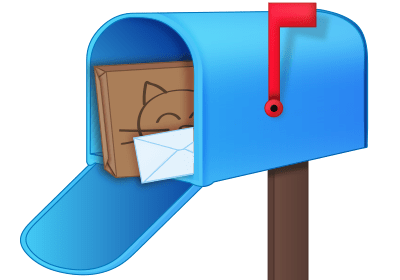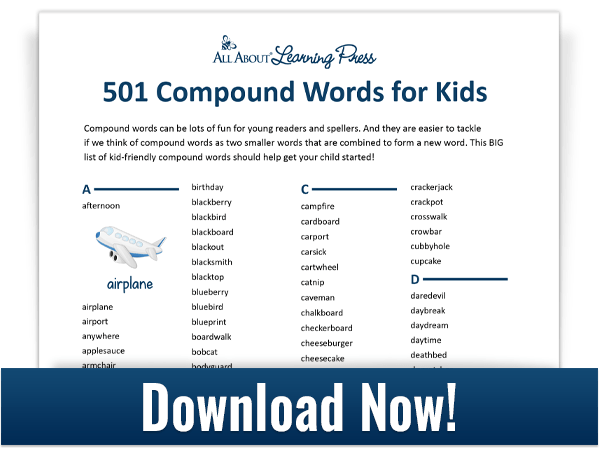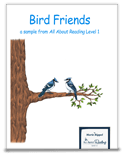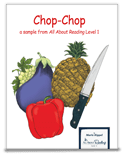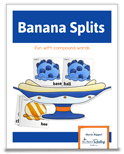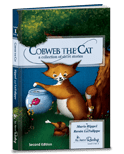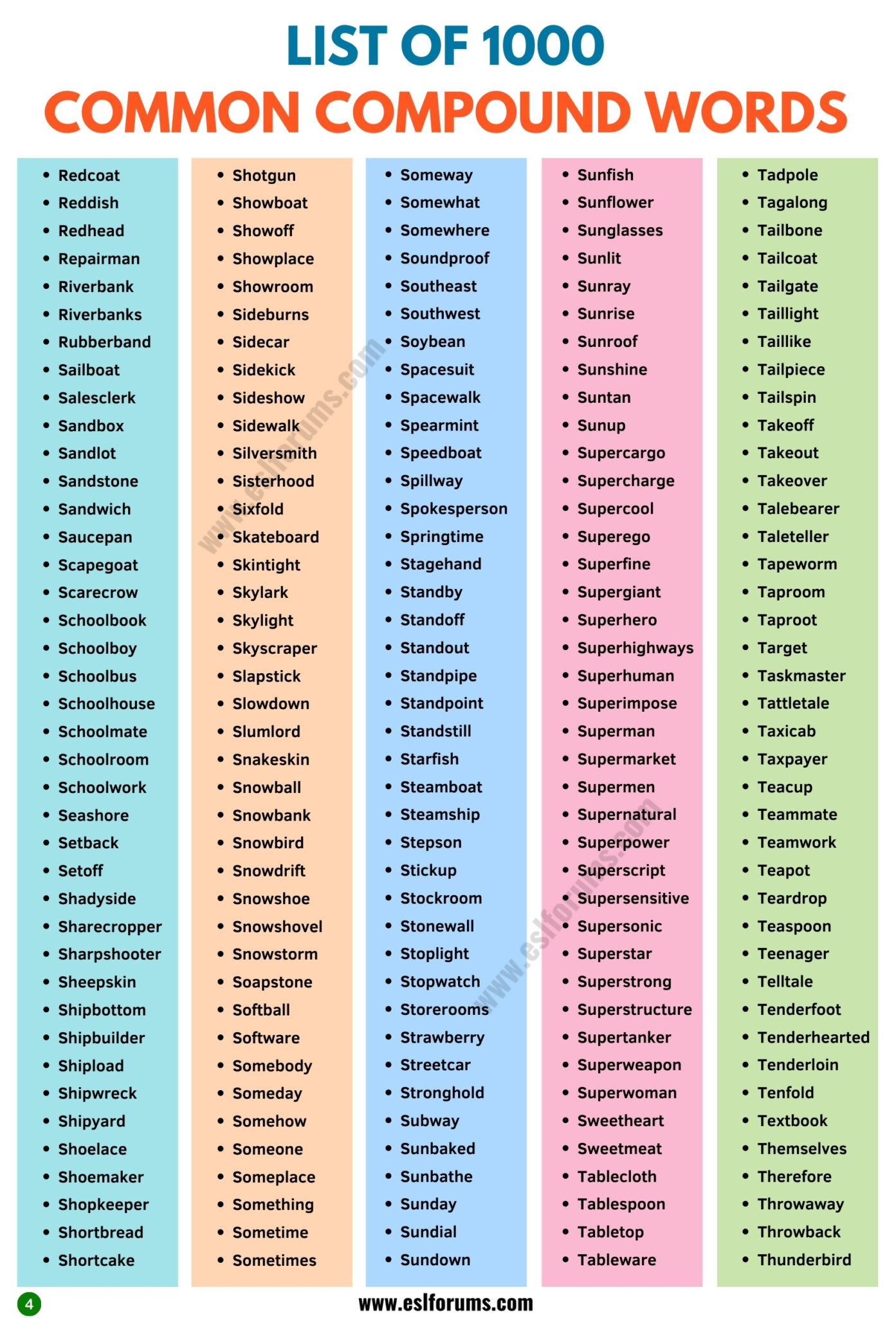First, what are compound words, and what are the 3 types of compound words?
Compound Definition/Compound Words Definition
A compound is a noun, an adjective or a verb made of two or more words, written as one or more words. A compound word can be closed ( for example, seafood), open for example, water ice) or hyphenated (for example, first-class).
- Closed compound words form one single word.
- Open compound words are spelled as two separate words.
- Hyphenated compound words are joined by a hyphen.
English Compound Words Examples/Compound Words List
- Closed compound words: Seafood, outcome, overcome, worksheet, downpour, seabird, sunflower, skincare, proofread, etc.
- Open compound words: Water ice, big hair, high school, dining table, dining room, etc.
- Hyphenated compound words: big-hearted, big-headed, self-actualization, well-known, well-cooked, etc.
Compound words examples
List of compound words
The following compound words lists are not comprehensive.
Compound Words: Compound Adjectives list
A compound adjective (also called compound modifier) is made up of two or more words that work jointly to modify the same noun. When compound adjectives are used before the noun they modify, they are usually hyphenated (joined together by a hyphen).
Compound adjectives whose first part is self are hyphenated as well. The words joined together by a hyphen are also known as hyphenated words.
Here is a hyphenated adjectives list:
- He is a well-off businessman.
- He belongs to a well-off family.
- His father is well off.
- She is a well-known writer.
- Stephen R. Covey is well known.
- Self-absorbed
- Self-aware = self-conscious
- Self-confident
- Self-contained
- Self-critical
- Self-educated
- Self-imposed
Compound adjectives can be created by joining multiple words; they can be in different combinations. Compound adjectives can be made up of adjectives, nouns, participles, quantifiers, and adverbs.
Here are some examples of the various combinations that we can make to come up with compound adjectives:
Compound adjectives lists:
- Adjective + Adjective: Top-right, top-left, blue-green, etc.
- Adjective + Noun: Part-time, full-time, good-time, etc.
- Noun + Adjective: Sugar-free, ice-cold, duty-free, homesick, etc.
As you can notice above we combine different parts of speech to create a new word.
Present and past participles can be joined with adjectives, nouns, and adverbs to make compound adjectives:
- Adjective + participle: Good-looking, hard-working, nice-looking, old-fashioned, open-minded, big-hearted, absent-minded, etc.
- Noun + participle: record-breaking, mouth-watering, human being, man-sized, home-made,
- Adverb + participle: Well-known, well-oiled, well rounded, badly-written, well-written, well-paid, dimly-lit, brightly-lit, early-rising, well-running,
Prepositions can also be employed to form compound adjectives:
- up-to-date laptops.
- a broken-down car.
- a beaten-up old truck.
- built-up areas.
- a cashed-up businesswoman.
- a built-in cupboard.
- a clapped out machine ( old and in bad condition)
Another way to form compound adjectives is to join a quantifier and a noun.
- A five-star hotel.
- A three-floor building.
- A three-storey building.
- A fifteen-year-old teenager.
A compound adjective with a number never takes the ‘s’ of the plural.
- There are 3 five-star hotels in this city.
- 10 three-floor buildings.
Compound Words: Compound adjectives to describe a person or something
Compound adjectives for character ( Compound adjectives personality) are usually used to describe people’s personality or character. The adjectives list below contains a number of compound adjectives tha can describe character. The other compoud adjectives can be used to describe something or someone not someone’s personality.
Compound Adjectives Examples
Hard-working is a compound adjective example
Here is a list of compound adjectives with self along with meaning
- Self-assured
you have confidence in your own abilities.
- Well-behaved
behave in a quiet and polite way.
- Self-centered
interested only in yourself.
- Self-conscious
uncomfortable or nervous because you are worried about what other people think about you or your behavior.
- Self-absorbed
a self-absorbed person is a person who is concerned about or interested in himself/herself.
- Self-addressed:
If an envelpoe is self-addressed, someone has written his/her own address on it.
- Self-adhesive
It can be stuck to something without the use glue, etc.
- Self-acting
Acting of or by itself.
- Self-appointed
A self appointed president is a president who has apointed himself/herself without the greement of his/her people.
- Self-assembly (esp, furniture)
Bought in several parts that you have to put together yourself.
- Self-assertive
A self-assertive man is a man who is very confident and not afraid to express his opinion about something or someone.
- Self-colour
Having one colour all over.
- Self-confessed
Admitting that you have done something, especially something bad.
- Self-contained (= independent)
If you are a self-contained woman, you don’t depend on other people or you do not need them.
- Self-contradictory
Containing two statements or ideas that connot both be true.
- Self-correcting
That can adjust or correct itself by itself.
- Self-critical
A self-critical person criticises himself/herself.
- Self-defeating
If a plan is self-defeating, it contains elements that will cause it to fail.
- Self-drive
A self-drive car is a car that you hire and drive by yourself.
- Self-deniying
Without concern for one’s own advantage; selfless.
- Self-effacing
A self-effacing man is a modest and does not want to attract attention to himeself or his abilities.
- Self-employed
If you are self-employed, you work for yourself and are not employed by a company, a person, etc.
- Self-evident
Obvious and does not need further explanation or proof.
- Self-explanatory
Easy to understand and does not nee any more explanation.
- Self-important
A slef-important person thinks that he/she is more important than others.
Other compound adjectives describing character
- Hard-working:
always doing a lot of work.
- Good-natured
naturally friendly and does not get angry easily.
- Over-confident
too sure about yourself and your abilities.
- Strong-willed
very determined to do what you want to do.
- Weak-willed
not determined enough to succeed in what you want to do.
- Strong-minded
somebody who is strong-minded is not willing to change their opinions and beliefs.
- Broad-minded
happy to accept ideas and ways of life different to your own.
- Open-minded
willing to accept opinions and ideas which are different from yours.
- Narrow-minded
not willing to accept ideas or ways of behaving that are different from your own.
- Bad-tempered
often annoyed, angry, or impatient.
- Short-tempered
if someone is short-tempered, he or she gets angry easily for no good reason.
- Easy-going
calm and relaxed; not easily worried or upset.
- Big-headed
you think you are more intelligent or more important than you really are.
- Thick-skinned
if you are thick-skinned, you are not easily hurt by criticism.
- Cold-hearted
if you are cold-hearted, you don’t feel sorry about other people’s suffering.
- Level headed
Calm and sensible; able to make good decisions even in difficult situations.
- Laid-back: You are not usually worried about other people’s behavior or things that need to be done.
These compound adjectives describing character traits are really interesting. So, which compound adjectives describe your personality?
Do this character adjectives quiz here to test your knowledge of compound adjectives.
Compound Nouns
Definition for compound noun
What is a compound noun? How do you make a compound noun? What are compound nouns?
A compound noun refers to a noun that is composed of two or more words. These compound words work together as a single unit to name a place, a person, or a thing. Compound nouns are usually created by joining two nouns or an adjective and a noun together (adjective+noun) (noun+adjective) (adjective+adjective), etc.
Compound nouns types
There are 3 types of compound nouns, namely open compound nouns. They are written as separate words ( living room, swimming pool, secretary general, etc.), closed compound nouns. They are written as one single word (blackbird, policeman, makeup, etc.), and hyphenated compound words (mother-in-law, father-in-law, check-in, etc.)
Compound Noun Examples
Here is a compound nouns list
20 + examples of compound nouns
There are different combinations of compound nouns, but they are usually combined this way: (noun + noun) (adjective + noun), (noun + adjective), (verb + noun), etc.
- Football (noun + noun)
- Snowman
- Sunflower
- Dragonfly
- Seafood
- Bookcase
- Toothpaste
- Backpack
- Living room
- Bedroom
- Bathroom
- Dining room
- Bathtub
- Website
- Policeman
- Policewoman
- Watercolor
- Bus stop
- Handbag
- Whiteboard ( adjective + noun)
- Blackboard
- Blackbird
- Greenhouse
- Greenpeace
- Software
- Mobile phone
- Full moon
- Full board
- Blackberry
- Check-in ( verb + preposition)
- Checkout
- Makeup
- lookout
- Drawback
- Fall-off
- Falling-out
- Fill-up
- Sunrise (noun + verb)
- Sunset
- Haircut
- Rainfall
Tip: To turn compound nouns into the plural, we usually add ‘s’, ‘es’ or ‘ies’ to the main word of the compound noun.
The main word is usually the second word, but there are exceptions.
A bookcase bookcases
A bedroom bedrooms
A handbag handbags
A website websites
But
A father-in-law fathers-in-law
A secretary general secretaries general
A passerby passers-by
We believe that this post is good for learners of English who want to broaden their knowledge of compound words. It can even be used by teachers to teach compound words.
Compound words video
Noun+noun compound nouns
| Noun | Noun | Compound noun |
| Sea | Food | Seafood |
| Sea | Farer | Seafarer |
| Home | Front | Home front |
| Home | Ground | Home ground |
| Home | Help | Home help |
| Home | Land | Homeland |
| Bus | Stop | Bus stop |
| Snow | Man | Snowman |
| Snow | Ball | Snowball |
Noun+adjective compound nouns
| Noun | Adjective | Compound noun |
| Spoon | Fu | Spoonful |
| Truck | Full | Truckful |
Here, you’ll find very important words that describe appearance.
Other useful links:
- The definite article in English
- Short stories with morals
- Best language learning quotes
Learn English online with Englishdotcom
1. The criteria of compounds
2. Semi-affixes
3. Classification of compounds
I
Compound
words are words consisting of at least two stems which occur in the
language as free forms.
In
describing the structure of a compound one should examine three types
of relations, namely the relations of the members to each other; the
relations of the whole to its members; and the correlation with
equivalent free phrases.
Some
compounds are made up of a determining and a determined part, which
may be called the determinant and the determinatum.
E.g.
A compound is indivisible. It’s impossible to insert words or
word-groups between its members.
A
sunbeam, a bright sunbeam, a bright and unexpected sunbeam. But no
insertion is possible between sun and beam, for they are not words
they are morphemes. The second stem beam is the basic part the
determinatum.
The determinant serves to differentiate it from other beams.
The
determinatum is the grammatically most important part which undergoes
inflection: sunbeams, brothers- in –law, passers-by etc.
As
for the semantics of the compounds, their meanings are not a mere sum
of the meanings of their components. A compound is often very
different in meaning from a corresponding syntactic group.
E.g.
blackboard and black board not every black board is a teaching aid
and vice-versa.
On
the other hand there are non-idiomatic compounds with a perfectly
clear motivation. Here we add the meanings of constituents to create
the meaning of a whole.
E.g.
seaman – when was first used there was no doubt (a profession
connected with sea).
As
English compounds consist of free forms, it is difficult to
distinguish them from phrases.
E.g.
phrase “the top dog” – a person occupying the foremost place;
a
compound “underdog” – a person who has the worst of an
encounter.
Thus
separating compounds from phrases and also from derivatives is no
easy task, and scholars are not agreed upon the question of relevant
criteria.
E.Nida
writes, that “the criteria for determining the word units in a
language are of three types: 1) phonological; 2) morphological; 3)
syntactic. No one type of criteria is normally sufficient for
establishing the word unit. Rather the combination of two or three
types is essential”.
He
doesn’t mention the graphic criterion (namely spelling). It is a
mistake, in ME the written form is as important as the oral.
We
can see in the dictionaries of different authors and even of the same
author that some words are spelled differently: headmaster –
head-master, airline – air line – air line.
The
lack of infirmity in spelling is the chief reason why many authors
consider this criterion insufficient. Some combine it with the phonic
criterion or stress.
There
is a marked tendency in English to give compounds a heavy stress on
the first element. Some scholars consider this unity of stress to be
of primary importance.
Thus,
Bloomfield writes: ”Wherever we hear lesser or least stress upon a
word which would always show a high stress in a phrase, we describe
it as a compound member: `ice-cream is a compound but `ice `cream is
a phrase although there is no denotative difference in meaning.
E.g.
`blackboard, `black `board; `blackbird, `black `bird etc.
This
rule doesn’t hold good with adjectives. Compound adjectives are
double stressed: `gray-`green, `easy-`going, `new-`born.
Adjectives
expressing emphatic comparison are heavily stressed on the first
element: `snow-white, `dog-cheap.
Moreover,
stress can be no help in solving the problem of compounds because
word stress may depend on phrasal stress or upon syntactic function
of the compound.
E.g.
light-headed has a single stress when it’s used attributively, in
other cases the stress is even.
Besides,
the stress may be phonological and help to differentiate the meaning
of compounds:
`overwork
– “extra work”
`over
`work – “hard work injuring ones health”
`bookcase
– “a piece of furniture”
`book
`case – “ a paper cover for books”
As
for morphological criteria they are manifold.
Smirnitsky
compares the compound shipwreck
and the phrase (the)
wreck of (a) ship.
They comprise the same morphemes. Although they don’t differ in
meaning, they stand in different relation to the grammatical system
of the language. From this example it follows that a word is
characterized by structural integrity non-existent in a phrase.
We
should remember E.Nida that no one type of criteria is normally
sufficient for establishing whether the unit is a compound or a
phrase. We have to depend on the combination of different types of
criteria. But even then the ground is not very safe and we meet here
a “stone-wall problem” that has received so much attention in
linguistic literature.
II
The
problem of distinguishing a compound from a derivative is actually
equivalent to distinguishing a stem from an affix.
In
most cases the task is simple enough. The immediate constituents of a
compound are free forms and a combination containing bound forms as
its immediate constituents, is a derivative.
But
there are cases which present difficulties.
Thus
such nouns as man, berry, land are very often used as the second
element in a word. They seem to have acquired valency similar to that
of affixes. As you remember they are called semi-affixes. Such
elements as –like, -proof, and –worthy can be referred to as
semi-affixes as well.
III
Classification
of compounds
The
great variety of compound types brings about a great variety of
classifications. Compound words can be classified according to the
type of a composition and the linking element; according to the
number of stems; according to the number of constituent parts;
according to the part of speech to which the compound belongs;
according to the structural pattern within a part of speech.
The
classification according to the type of composition permits us to
establish the following groups:
1)
The predominant type without any linking element: heartache,
heart-brake.
2)
Composition with a vowel or a consonant as a linking element:
speedometer,
statesman.
3)
Compounds with linking elements presented by preposition or
conjunction stems: matter-of-fact; up-to-date; son-in-law;
forget-me-not; what’s-her-name (n).
4)
Compound-derivatives or derivational compounds: kind-hearted;
old-timer;
teenager.
The
classification of compounds according to the structure of immediate
constituents distinguishes:
1.Compounds
consisting of simple stems: film-star
2.Compounds
where one of the constituents is a derived stem: chaine-smoker.
3.Compounds
where at least one of members is a clipped stem: maths-mistress;
H-bag (handbag) or X mas (Christmas).
4.Compounds
in which at least one of the constituents is a compound stem:
wastwpaper-basket.
Соседние файлы в предмете [НЕСОРТИРОВАННОЕ]
- #
- #
- #
- #
- #
20.03.2015540.67 Кб9W3.doc
- #
- #
- #
- #
- #
- #
Compound words are formed when two smaller words combine to form a new word, as in these examples:
mail + box = mailbox
milk + shake = milkshake
note + book = notebook
The resources in this article can help you introduce compound words to your children and make them feel like superheroes for being able to read and spell such long words!
What Is a Compound Word?
Compound words can be lots of fun for young readers and spellers. And they are easier to tackle if we think of compound words as two smaller words that are combined to form a new word.
But there’s another important thing to consider when teaching compound words!
When deciding of a word is a compound, remember that the meaning of the compound word relates to the meanings of the two words that combine to form it. For example, a bathtub is a tub you take a bath in. A sandbox is a box you put sand in. An anthill is a hill made by ants, and so on.
Download This Free List of Compound Words
This big list of kid-friendly compound words will be a great resource as you work on this skill together.
Teach How to Look for the Two Smaller Words in the Compound Word
The easiest way to introduce compound words is with letter tiles. Choose a word such as bathtub from the resource list and build it with the tiles.
Explain to your child that the word bathtub has two smaller words in it, and invite him to find those two smaller words. Letter tiles are great for this activity because your child can separate the compound word into two words, like this:
Suddenly, longer words are no longer scary! See why I love letter tiles so much? You can practice this concept with fun words like sandbox, anthill, backpack, and windmill. This is a wonderful method for helping students visualize the words that form compound words.
Games and Activity Sheets for Compound Words
Hands-on games and activities make learning about compound words more fun! Here are three free printables that you can use with your child. The first two activities come from All About Reading Level 1, and the third activity was designed for all reading levels.
“Bird Friends” Activity
Birds of a feather flock together … and in this fun reading activity, birds of a feather make compound words, too! Just have your child select two matching birds and place them side by side on the branch. Each pair of birds makes a compound word!
“Chop-Chop” Activity
Practice compound words with this fun (and safe!) chopping game! Just cut out the knife and the foods, then let your child “chop” each compound word between its two smaller words. Read each smaller word, and then read the compound word.
“Banana Splits” Game
Use compound words to build the yummiest banana split ever in this delicious multi-level reading game. Every player gets an ice cream bowl and a stack of candy covered scoops of ice cream to play with. And the best part? Students of different levels can play together!
Spelling Tips for Compound Words
When your child is spelling, it may not be obvious when to combine two words into one. This process is made more difficult by the fact that there are actually three kinds of compound words. There are closed compounds, which we have been discussing in this article so far. And then there are open compounds and hyphenated compounds.
If your child needs to spell the word ice cream, for example, there is no rule that will help her decide whether this is a closed or open compound word. She’ll just need to determine what “looks right,” and the only way to do that is to have seen it in writing before (preferably multiple times). The Practice Sheets in All About Reading and the Word Banks in All About Spelling are excellent tools to do just that.
Of course, reading word lists isn’t all that exciting. Reading a short story about a sassy cat, on the other hand, is a much more engaging way to practice reading compound words! Here’s the first story with compound words that beginning readers encounter in All About Reading Level 1.
Cobweb the Cat short story
In this story, young readers encounter fourteen different closed compound words, including bathtub, catfish, and sunset. All of these words are pre-taught through various activities, so even before reading the story, the child has already become familiar with them.
The more times your student sees compound words in print, the easier it will be for him to spell them. And that leads us to our final tip for teaching children to spell compound words…
Provide Oral “Hints” During Spelling Dictation
To increase your child’s awareness of compound words during spelling dictation, provide prompts such as “This next sentence has a compound word.” After your child sees closed compound words in print a number of times, he’ll begin to get a sense of when to combine two smaller words into one.
The bottom line when teaching compound words is practice, practice, practice! But make practice a joy by incorporating letter tiles, activity sheets, short reading selections, and spelling dictation “hints.”
What are your favorite ways to practice compound words? Let me know in the comments below!
One major grammatical point when speaking, reading or writing in English are compound words. What are compound words? We are going to look at what these words are and how they are formed, as well as looking at some examples of these types of words.
What is a Compound Word?
In simple terms, a compound word is a word which is made up of two or more words, usually two words, which are put together to form a new meaning, for example ‘deck chair.’
Compound word examples:
- help desk
- hot dog
- bookstore
- classmate
- queen-size
- one-sided
- well-educated
Types of Compound Words
Compound words can fall into one of two categories, each of which has subcategories. Let’s take a closer look at these two types.
Words classified by their form
The first type are compound words which are classified by their form. There are three forms of compound words, these are open form, closed form and hyphenated form. Here is a short description of each of these forms to make them easier to understand. Each description will also have an example of the word used in a sentence.
- Open form compound words are two words which are written independently of one another, separated by a space. An example of this type of compound word would be ‘ice cream.’ Here you can see it used in a sentence ‘I brought an ice cream from the store.’
- Closed form compound words are two words which have been joined together to make a new word, they are not separated by a space and are written one right after the other. An example of this type of compound word is ‘snowman.’ Here you can see the word used in a sentence. ‘At Christmas time, when it snowed, we built a snowman.’
- A hyphenated compound word is two words which are put together and separated by a hyphen. An example of this type of compound word is ’empty-handed.’ This is an example of how the word would look in a sentence. ‘I entered the competition but I came home empty-handed as I did not win.’
Words classified by their class
The next category that compound words can fall into is the word class. There are three subcategories for this type of compound word as well. These are compound verbs, compound adjective and compound nouns. Here is a short description of each of these types of compound words and some examples to further explain how they word both on their own and in a sentence.
- Compound verbs are words which describe an action. Unlike a regular verb, a compound verb is made up of two words. Compound verbs are usually open formed. An example of a compound verb is ‘ask for.’ Here you can see the word used in a sentence. ‘I like to regularly ask for updates on the project.’
- Compound adjectives are words which are descriptive. Unlike a regular adjective, a compound adjective is made of two words. Compound adjectives are usually hyphenated. An example of a compound adjective is ‘blue-eyed.’ Here is a sentence which contains the word to show how it would work. ‘My wife and daughter are both blue-eyed.‘
- Compound nouns are words which give a name to something. Unlike regular nouns, a compound noun is made up of two words. Compound nouns are usually closed form. An example of a compound noun is ‘apple tree.’ Here is an example of a sentence which contains this compound verb. ‘In the orchard we have several apple trees and one large oak.’
Lists of Compound Words
We will now list a variety of words from each of the classifications and subcategories of compound words.
Open Form Compound Words
- full moon
- living room
- dining room
- curtain rail
- deck chair
- tea cup
- dinner plate
- serving spoon
- clothes peg
- dance hall
- seat belt
- coffee grain
- ice cube
- ice cream
- real estate
- yard sale
- hand towel
- cell phone
- high school
- middle school
- grammar school
- elementary school
- car pool
- course work
- disc drive
- common sense
- key pal
- jumping jack
- energy bar
- help desk
- hot dog
- dirt bike
- landing field
- radio waves
- rib cage
- memory stick
- report card
Closed Form Compound Words
- windfall
- baseball
- worldwide
- southeast
- sailboat
- railway
- stockbroker
- snowman
- birthday
- wildcat
- football
- peanut
- afternoon
- anytime
- blackboard
- bookstore
- classmate
- eyeball
- freelance
- gridlock
- hamburger
- jigsaw
- knighthood
- lipstick
- moonlight
- overkill
- pothole
- runway
- showoff
- strawberry
- uptown
- uproot
- wrongdoing
- workplace
- workshop
- underdog
- today
- springtime
- somehow
- rainbow
- redhead
- rattlesnake
- playground
- overpass
Hyphenated Form Compound Words
- able-bodied
- runner-up
- clean-cut
- follow-up
- high-tech
- close-up
- father-in-law
- king-size
- queen-size
- one-sided
- run-in
- self-concept
- tip-off
- word-of-mouth
- self-service
- three-dimensional
- well-to-do
- hush-hush
- strong-arm
- x-ray
- toss-up
- well-being
- shrink-wrap
- u-turn
- topsy-turvy
- single-minded
- merry-go-round
- short-tempered
- on-site
- off-site
- life-sized
- in-depth
Compound Verbs
- blow up
- ask out
- blow out
- add up to
- break down
- break up
- break into
- bring down
- call back
- call around
- call off
- catch up
- check in
- cheer up
- come apart
- come down with
- come about
- come around
- count on
- cross out
- come in
- do over
- drop back
- drop in
- drop down
- eat out
- end up
- fall apart
- fall back
- fall over
- fall down
- fill out
- fill up
- find out
- get along
- get across
- get in
- get out
- get over
- get back
- get away with
- give up
- give away
- give in to
- go ahead
- go after
- go around
- go back
- go into
- grow up
- grow back
- grow apart
- hang out
- keep up
- keep on top of
- let down
- log in
- log out
- look for
- look out
- make up
- make over
- pass away
- pass on
- pay back
- point out
- put down
- put away
- put back
- run out
- run into
- sort out
- sleep over
- sleep in
- switch on
- switch off
- take back
- take off
- think up
- think over
Compound Adjectives
- good-looking
- long-lasting
- English-speaking
- well-known
- part-time
- middle-aged
- well-behaved
- well looked-after
- long-haired
- sparsely-populated
- well-educated
- dimly-lit
- sought-after
- mouth-watering
- fast-moving
- time-saving
- fat-free
- full-length
- world-famous
- five-foot
- brown-eyed
- blonde-haired
- open-minded
- closed-minded
- red-coloured
- five-minute
- short-tempered
- hot-headed
- small-minded
- well-behaved
- hard-working
Compound Nouns
- eyeball
- snowman
- heartbeat
- sunrise
- raindrop
- moonlight
- myself
- grandfather
- grandmother
- grandchild
- anymore
- goldfish
- skateboard
- seaside
- sunshine
- sunset
- lifespan
- friendship
- gentleman
- cowboy
- birthday
- bookshelf
- battelfield
- chopstick
- dishwasher
- dishwater
- haircut
- earring
- landlord
- necklace
- bypass
- notebook
- houseboat
- pancake
- ladybug
- ringworm
- thunderstorm
- teardrop
- teacake
- headache
- backache
- doorbell
- toolbox
Compound Words | Infographic

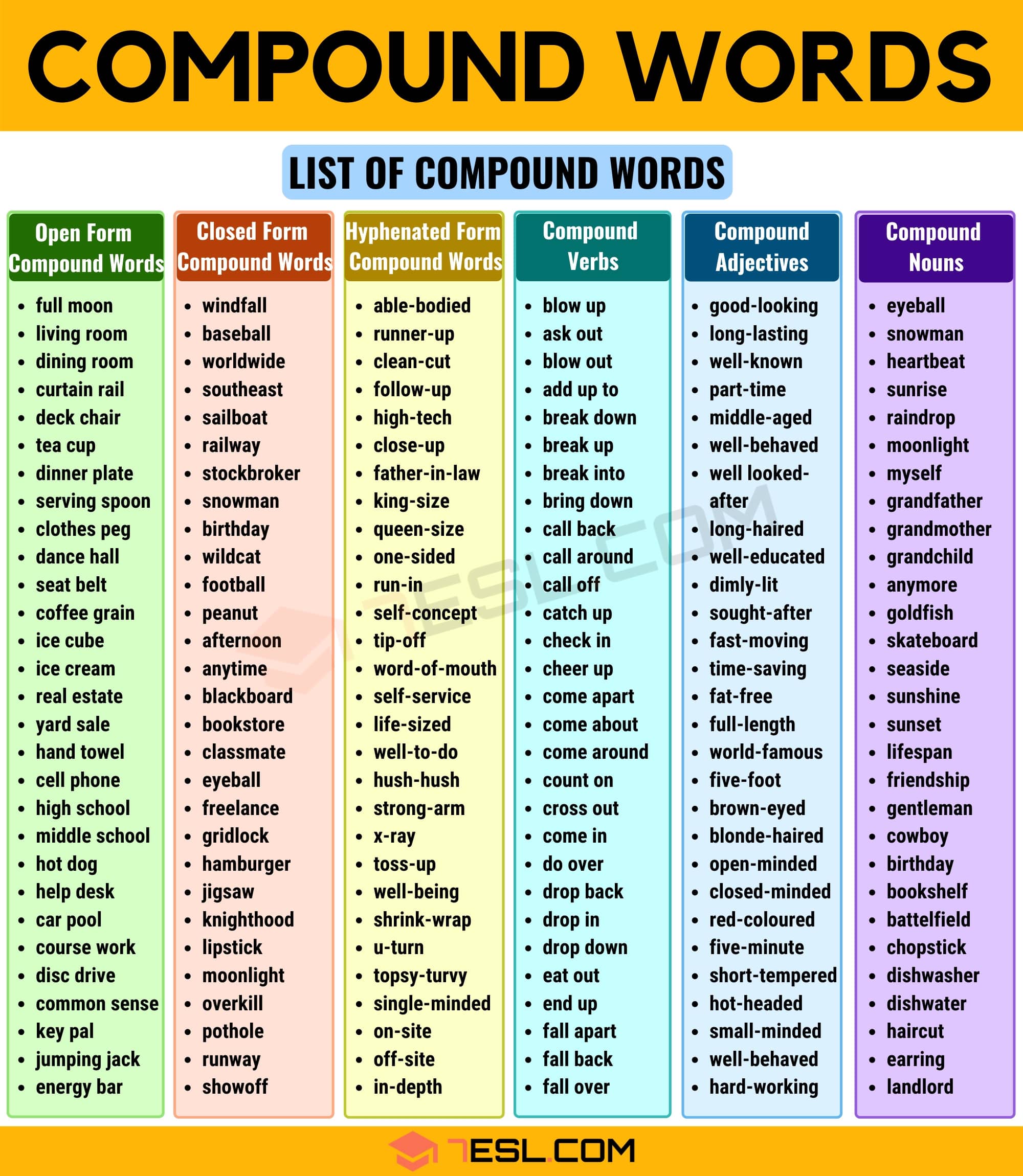
Last Updated on February 10, 2020
Every word has its own meaning. You can search for the definition of every term in the dictionary. But do you know that you can put two words together and have a brand new meaning? Of course, not all words can be put together for such a case. However, many ones are already accepted in the English language. These words are called compound words.
What Are Compound Words?
Compound words are formed when two or more words are combined to produce a new one. This newly-constructed word has its own meaning that can either be related to the base words or not.
Types of Compound Words
Open Compound Words
Open compound words remain separate when written but are used together to create a new idea. For example, “peanut” and “butter” are unrelated to each other. But when you combine them and use them as one word, you will have “peanut butter,” which is already a different noun with its own meaning.
Closed Compound Words
Closed compound words are formed by combining two fully independent words together without space in between. An example of a closed-form compound word is “grandfather,” in which “grand” and “father” are put together.
Hyphenated Compound Words
Another possible form of a compound word is the hyphenated one. From the word itself, the independent terms used are separated by a hyphen or dash. A common example is “mother-in-law.”
Compound Nouns
Compound nouns are simply compound words that act as nouns. Nouns are names of people, animals, places, things, or events. However, it does not mean that the two words comprising it should only be nouns. A compound noun can be formed by combining two nouns, an adjective and a noun, a verb and a noun, and many more.
Compound Verbs
A compound verb is also called a complex predicate. It is a multi-word compound that acts as a single verb. It can be constructed by putting together a verb and a preposition or a verb and an adverb (phrasal verbs). Auxiliary verbs that are followed by the main verb can also be considered compounds. Some other combinations that involve a verb and a non-verb word can also be considered compound verbs if they indicate action.
Compound Adjectives
Two or more words that function as one and describe a noun are called compound adjectives. Usually, they are separated by a hyphen.
List of Compound Words
Open Compound Words
- Ice cream
- Ice cream cake
- Ice cube
- Cream cheese
- Hot dog
- Corn dog
- Corned beef
- Apple pie
- Sugar plum
- Web page
- Table cloth
- Fire drill
- Fire drill
- Fire exit
- High school
- Roller coaster
- Living room
- First aid
- Full moon
- Tea cup
- Serving spoon
- Real estate
- Car pool
- Cotton bud
- Cotton ball
- Video game
- Coffee grain
- Coffee mug
- Post office
- Upper deck
- Hand towel
- Sweet tooth
- Common sense
- Dance hall
- Police officer
- Vice president
- Science fiction
- Root word
- Candy cane
- Christmas tree
- Cell membrane
- Jumping jack
- Report card
- Credit card
- Debit card
- Radio wave
- Snack house
- Coffee shop
- Bus stop
- Swimming pool
- Rubber band
- Ice hockey
- Ice skate
- Break up
- Take away
- Take out
- Break away
- Lift up
- Push down
- Pull down
- Ask out
- Ask around
- Make up
- Turn in
- Fill up
- Fill out
- Fill in
Closed Compound Words
- Basketball
- Football
- Baseball
- Worldwide
- Overpass
- Southeast
- Northeast
- Northwest
- Southwest
- Bushfire
- Mailbox
- Snowball
- Skateboard
- Sailboat
- Birthday
- Blackboard
- Everything
- Anything
- Anyone
- Everyone
- Classmate
- Schoolmate
- Playmate
- Grandmother
- Grandfather
- Granddaughter
- Grandson
- Grasshopper
- Sunflower
- Sunrise
- Sunshine
- Moonlight
- Freelance
- Eyeball
- Eyebrow
- Eyelash
- Armpit
- Playground
- Teamwork
- Stoplight
- Flashlight
- Lighthouse
- Fireman
- Rainbow
- Raindrop
- Bedroom
- Popcorn
- Keyboard
- Notepad
- Keyhole
- Keystone
- Pothole
- Bowtie
- Necktie
- Brainwash
- Proofread
- Babysit
- Horseshoe
- Highlight
- Notebook
- Bookstore
- Lipstick
- Makeup
- Toothpaste
- Toothbrush
- Airbrush
- Crosswalk
- Crossroad
- Crossover
- Nightfall
- Riverbank
- Nutcracker
- Candlelight
- Backstroke
- Hamburger
- Cheeseburger
- Sandwich
- Homesick
- Uptown
- Rattlesnake
- Workplace
- Wrongdoing
- Springtime
- Underdog
- Strawberry
- Blueberry
- Watermelon
- Pineapple
- Cupcake
Hyphenated Compound Words
- Mother-in-law
- Father-in-law
- Sister-in-law
- Brother-in-law
- Sergeant-at-arms
- Merry-go-round
- Happy-go-lucky
- Editor-in-chief
- Over-the-counter
- Up-to-date
- State-of-the-art
- Long-term
- High-speed
- Left-handed
- Right-handed
- In-depth
- Full-length
- Part-time
- Long-haired
- Sun-dried
- Breath-taking
- Self-centered
- Well-off
- Well-known
- Gift-wrap
- Follow-up
- Well-being
- Single-minded
- Knee-length
- Short-tempered
- Off-site
- Runner-up
- One-sided
- Tip-off
- Blush-on
- Sugar-free
- Ice-cold
- Far-flung
- High-rise
- Life-size
- King-size
- Warm-blooded
- Cold-blooded
- Get-together
- Next-door
A Huge List of Compound Words
Following is a list of 1000 close compound words in English
- Aboveboard
- Afterbirth
- Afterburner
- Afterglow
- Afterimage
- Afterlife
- Aftermath
- Afternoon
- Airbrush
- Aircraft
- Airfield
- Airlift
- Airline
- Airliner
- Airmail
- Airman
- Airmen
- Airplane
- Airport
- Airship
- Airtime
- Allover
- Allspice
- Alongside
- Also
- Another
- Anybody
- Anyhow
- Anymore
- Anyone
- Anyplace
- Anything
- Anytime
- Anyway
- Anywhere
- Armchair
- Armpit
- Around
- Arrowhead
- Ashtray
- Authorship
- Babysit
- Babysitter
- Backache
- Backbite
- Backbone
- Backbreaker
- Backdrop
- Backfield
- Backfire
- Background
- Backhand
- Backlash
- Backlog
- Backpack
- Backside
- Backslap
- Backslide
- Backspace
- Backspin
- Backstage
- Backstop
- Backstretch
- Backstroke
- Backtrack
- Backward
- Ballpark
- Ballroom
- Bankbook
- Bankroll
- Baseball
- Basketball
- Beachcomb
- Became
- Because
- Become
- Bedbug
- Bedclothes
- Bedrock
- Bedroll
- Bedroom
- Bellbottom
- Bellboy
- Bellhop
- Below
- Birthday
- Blackball
- Blackberries
- Blackbird
- Blackboard
- Blackjack
- Blacklist
- Blackmail
- Blackout
- Blacksmith
- Blacktop
- Bluebell
- Blueberry
- Bluebird
- Bluefish
- Bluegrass
- Blueprint
- Boardwalk
- Bodyguard
- Bodywork
- Boldface
- Bookbinder
- Bookcase
- Bookend
- Bookkeeper
- Booklet
- Bookmark
- Bookmobile
- Bookseller
- Bookshelf
- Bookstore
- Bookworm
- Bootstrap
- Bowtie
- Brainchild
- Brainstorm
- Brainwash
- Bugspray
- Bushfire
- Buttercup
- Butterfat
- Butterfingers
- Butterflies
- Buttermilk
- Butternut
- Butterscotch
- Bypass
- Cabdriver
- Cancan
- Candid
- Candlelight
- Candlestick
- Cannot
- Cardboard
- Cardsharp
- Cardstock
- Carefree
- Caretaker
- Careworn
- Carfare
- Cargo
- Carhop
- Carload
- Carpetbagger
- Carpool
- Carport
- Carrack
- Carryall
- Carsick
- Cartwheel
- Carwash
- Cattail
- Catwalk
- Caveman
- Centercut
- Cheeseburger
- Cheesecake
- Classmate
- Clockwise
- Coffeemaker
- Comeback
- Comedown
- Commonplace
- Commonwealth
- Cornball
- Cornmeal
- Cornstalk
- Cornwall
- Cottonmouth
- Cottontail
- Cottonwood
- Countdown
- Counterattack
- Counterbalance
- Counterclockwise
- Counterintelligence
- Countermeasure
- Counteroffensive
- Counterpane
- Counterpart
- Counterpoint
- Counterpoise
- Courthouse
- Courtroom
- Courtyard
- Crewcut
- Crossbow
- Crossbreed
- Crosscut
- Crossover
- Crossroad
- Crosstown
- Crosswalk
- Crossword
- Cupcake
- Dairymaid
- Daisywheel
- Daybed
- Daybook
- Daybreak
- Daydream
- Daylight
- Daytime
- Deadend
- Deadline
- Dishcloth
- Dishpan
- Dishwasher
- Dishwater
- Diskdrive
- Dogwood
- Doorstop
- Downbeat
- Downunder
- Drawbridge
- Driveway
- Duckbill
- Duckpin
- Earache
- Eardrop
- Eardrum
- Earring
- Earthbound
- Earthquake
- Earthward
- Earthworm
- Egghead
- Eggshell
- Elsewhere
- Everyone
- Everything
- Eyeball
- Eyeballs
- Eyebrow
- Eyecatching
- Eye-catching
- Eyeglasses
- Eyelash
- Eyelid
- Eyesight
- Eyewitness
- Fatherland
- Fatherless
- Firearm
- Fireball
- Fireboat
- Firebomb
- Firebox
- Firebreak
- Firecracker
- Firefighter
- Fireflies
- Firehouse
- Fireman
- Fireproof
- Firewater
- Fireworks
- Fishbowl
- Fisherman
- Fisheye
- Fishhook
- Fishlike
- Fishmonger
- Fishnet
- Fishpond
- Fishtail
- Flashlight
- Football
- Foothill
- Foothold
- Footlights
- Footlocker
- Footnote
- Footpath
- Footprints
- Footrest
- Forbearer
- Forbid
- Forearm
- Forebear
- Forecast
- Forecastle
- Foreclose
- Foreclosure
- Foredoom
- Forefather
- Forefinger
- Forefront
- Forehand
- Forehead
- Foreleg
- Foreman
- Foremost
- Forepaws
- Forerunner
- Foresee
- Foresight
- Forestall
- Forestland
- Forever
- Forget
- Forgive
- Forklift
- Format
- Fortnight
- Freelance
- Friendship
- Fruitcup
- Gearshift
- Glassmaking
- Goodbye
- Goodnight
- Grandaunt
- Grandchild
- Grandchildren
- Granddaughter
- Grandfather
- Grandmaster
- Grandmother
- Grandnephew
- Grandnieces
- Grandparent
- Grandson
- Grandstand
- Granduncle
- Grasshopper
- Graveyard
- Gumball
- Haircut
- Hamburger
- Hammerhead
- Hamstring
- Handball
- Handbook
- Handcuff
- Handgun
- Handmade
- Handout
- Headache
- Headdress
- Headhunter
- Headlight
- Headline
- Headquarters
- Hedgehop
- Heirloom
- Hellcat
- Hellhole
- Helpmate
- Helpmeet
- Hemstitch
- Henceforth
- Henchman
- Henpeck
- Hereabout
- Hereafter
- Hereby
- Herein
- Hereof
- Hereupon
- Herself
- Highball
- Highchair
- Highland
- Highlight
- Highway
- Himself
- Homemade
- Homesick
- Hometown
- Honeybee
- Honeycomb
- Honeydew
- Honeymoon
- Honeysuckle
- Hookup
- Hookworm
- Horseback
- Horsefly
- Horsehair
- Horseplay
- Horsepower
- Horseradish
- Horseshoe
- Houseboat
- Housecoat
- Household
- Housekeeper
- Housetop
- Housewife
- Housework
- However
- Ideal
- Inchworm
- Income
- Indoors
- Inflow
- Infold
- Infuse
- Infusion
- Inhale
- Inkblot
- Inkwell
- Inland
- Inmate
- Inpatient
- Inroad
- Inset
- Inside
- Intake
- Ironwork
- Itself
- Jackpot
- Jackson
- Jailbait
- Jailbird
- Jawbone
- Jawbreaker
- Jaywalk
- Jellybean
- Jellyfish
- Jerkwater
- Jerrybuild
- Jetliner
- Jetport
- Jigsaw
- Jimsonweed
- Jitterbug
- Jobholder
- Johnnycake
- Jumpshot
- Keepsake
- Keyboard
- Keyhole
- Keynote
- Keypad
- Keypunch
- Keystone
- Keystroke
- Keyway
- Keyword
- Landmark
- Landslide
- Landward
- Lapland
- Lapwing
- Larkspur
- Laughingstock
- Lawgiver
- Lawmaker
- Lawsuit
- Layman
- Layoff
- Layout
- Layover
- Leapfrog
- Lifeblood
- Lifeboat
- Lifeguard
- Lifelike
- Lifeline
- Lifelong
- Lifesaver
- Lifetime
- Lifework
- Lighthouse
- Limelight
- Limestone
- Lipstick
- Longhand
- Longhorn
- Longhouse
- Lukewarm
- Mailbox
- Mainland
- Mainline
- Mainspring
- Mainstream
- Makeup
- Matchbox
- Meadowland
- Meantime
- Meanwhile
- Moonbeam
- Moonlight
- Moonlit
- Moonscape
- Moonshine
- Moonstone
- Moonstruck
- Moonwalk
- Moreover
- Mothball
- Motherhood
- Motorcycle
- Nearby
- Necktie
- Nevermore
- Newborn
- Newfound
- Newsboy
- Newsbreak
- Newscast
- Newscaster
- Newsdealer
- Newsletter
- Newsman
- Newsmen
- Newspaper
- Newsperson
- Newsprint
- Newsreel
- Newsroom
- Newsstand
- Newsworthy
- Nightfall
- Nobody
- Noisemaker
- Northeast
- Northwest
- Notebook
- Notepad
- Noteworthy
- Nowhere
- Nursemaid
- Nutcracker
- Oneself
- Onetime
- Overabundance
- Overboard
- Overcoat
- Overflow
- Overland
- Overpass
- Overshoes
- Pacemaker
- Pancake
- Parkway
- Passbook
- Passkey
- Passover
- Passport
- Password
- Pasteboard
- Patchwork
- Pathfinder
- Pathway
- Pawnbroker
- Pawnshop
- Paycheck
- Payload
- Paymaster
- Payoff
- Payroll
- Peppermint
- Pickup
- Pineapple
- Pinhole
- Pinpoint
- Pinstripe
- Pinup
- Pinwheel
- Playback
- Playboy
- Playground
- Playhouse
- Playmate
- Playthings
- Ponytail
- Popcorn
- Postcard
- Pothole
- Proofread
- Racquetball
- Railroad
- Railway
- Rainbow
- Raincheck
- Raincoat
- Raindrop
- Rainfall
- Rainmaker
- Rainstorm
- Rainwater
- Ratline
- Ratsbane
- Rattlesnake
- Rattletrap
- Rawboned
- Rawhide
- Readywitted
- Rearmost
- Rearrange
- Rearward
- Redcap
- Redcoat
- Reddish
- Redhead
- Repairman
- Riverbank
- Riverbanks
- Rubberband
- Sailboat
- Salesclerk
- Sandbox
- Sandlot
- Sandstone
- Sandwich
- Saucepan
- Scapegoat
- Scarecrow
- Schoolbook
- Schoolboy
- Schoolbus
- Schoolhouse
- Schoolmate
- Schoolroom
- Schoolwork
- Seashore
- Setback
- Setoff
- Shadyside
- Sharecropper
- Sharpshooter
- Sheepskin
- Shipbottom
- Shipbuilder
- Shipload
- Shipwreck
- Shipyard
- Shoelace
- Shoemaker
- Shopkeeper
- Shortbread
- Shortcake
- Shotgun
- Showboat
- Showoff
- Showplace
- Showroom
- Sideburns
- Sidecar
- Sidekick
- Sideshow
- Sidewalk
- Silversmith
- Sisterhood
- Sixfold
- Skateboard
- Skintight
- Skylark
- Skylight
- Skyscraper
- Slapstick
- Slowdown
- Slumlord
- Snakeskin
- Snowball
- Snowbank
- Snowbird
- Snowdrift
- Snowshoe
- Snowshovel
- Snowstorm
- Soapstone
- Softball
- Software
- Somebody
- Someday
- Somehow
- Someone
- Someplace
- Something
- Sometime
- Sometimes
- Someway
- Somewhat
- Somewhere
- Soundproof
- Southeast
- Southwest
- Soybean
- Spacesuit
- Spacewalk
- Spearmint
- Speedboat
- Spillway
- Spokesperson
- Springtime
- Stagehand
- Standby
- Standoff
- Standout
- Standpipe
- Standpoint
- Standstill
- Starfish
- Steamboat
- Steamship
- Stepson
- Stickup
- Stockroom
- Stonewall
- Stoplight
- Stopwatch
- Storerooms
- Strawberry
- Streetcar
- Stronghold
- Subway
- Sunbaked
- Sunbathe
- Sunday
- Sundial
- Sundown
- Sunfish
- Sunflower
- Sunglasses
- Sunlit
- Sunray
- Sunrise
- Sunroof
- Sunshine
- Suntan
- Sunup
- Supercargo
- Supercharge
- Supercool
- Superego
- Superfine
- Supergiant
- Superhero
- Superhighways
- Superhuman
- Superimpose
- Superman
- Supermarket
- Supermen
- Supernatural
- Superpower
- Superscript
- Supersensitive
- Supersonic
- Superstar
- Superstrong
- Superstructure
- Supertanker
- Superweapon
- Superwoman
- Sweetheart
- Sweetmeat
- Tablecloth
- Tablespoon
- Tabletop
- Tableware
- Tadpole
- Tagalong
- Tailbone
- Tailcoat
- Tailgate
- Taillight
- Taillike
- Tailpiece
- Tailspin
- Takeoff
- Takeout
- Takeover
- Talebearer
- Taleteller
- Tapeworm
- Taproom
- Taproot
- Target
- Taskmaster
- Tattletale
- Taxicab
- Taxpayer
- Teacup
- Teammate
- Teamwork
- Teapot
- Teardrop
- Teaspoon
- Teenager
- Telltale
- Tenderfoot
- Tenderhearted
- Tenderloin
- Tenfold
- Textbook
- Themselves
- Therefore
- Throwaway
- Throwback
- Thunderbird
- Thunderbolt
- Thundershower
- Thunderstorm
- Timekeeper
- Timepieces
- Timesaving
- Timeshare
- Timetable
- Today
- Together
- Toolbox
- Toothbrush
- Toothpaste
- Toothpick
- Touchdown
- Township
- Turnabout
- Turnaround
- Turnbuckle
- Turncoat
- Turndown
- Turnkey
- Turnoff
- Turnover
- Turntable
- Typewriter
- Underachieve
- Underact
- Underage
- Underarm
- Underbelly
- Underbid
- Undercharge
- Underclothes
- Undercover
- Undercurrent
- Undercut
- Underdevelop
- Underdog
- Underesimate
- Underestimate
- Underexpose
- Underfeed
- Underfinance
- Underfoot
- Underfur
- Undergarment
- Undergird
- Undergo
- Undergraduate
- Underground
- Undergrowth
- Underhand
- Underhanded
- Underlayer
- Underlie
- Upbeat
- Upbringing
- Upcoming
- Update
- Updraft
- Upend
- Upgrade
- Upheaval
- Upheld
- Uphill
- Uphold
- Upkeep
- Upland
- Uplift
- Uplink
- Upload
- Upmarket
- Upon
- Uppercase
- Upperclassman
- Uppercut
- Uppermost
- Upright
- Uprising
- Upriver
- Uproar
- Uproot
- Upset
- Upshot
- Upside
- Upstage
- Upstairs
- Upstanding
- Upstart
- Upstate
- Upstream
- Upsurge
- Upswing
- Uptake
- Upthrust
- Uptight
- Uptime
- Uptown
- Upturn
- Upward
- Upwind
- Waistband
- Waistcoat
- Waistline
- Walkout
- Walkways
- Wallboard
- Walleyed
- Wallflower
- Wallpaper
- Wanderlust
- Wardroom
- Warehouse
- Warfare
- Warhead
- Warlike
- Warlord
- Warmblooded
- Warmhearted
- Warmonger
- Warpath
- Warplanes
- Warship
- Wartime
- Washboard
- Washbowl
- Washcloth
- Washout
- Washroom
- Washstand
- Washtub
- Wastebasket
- Wasteland
- Wastepaper
- Wastewater
- Watchband
- Watchcase
- Watchdog
- Watchmaker
- Watchman
- Watchtower
- Watchword
- Watercolor
- Watercooler
- Watercraft
- Waterfall
- Waterfowl
- Waterfront
- Waterline
- Waterlog
- Watermark
- Watermelon
- Waterpower
- Waterproof
- Waterscape
- Watershead
- Waterside
- Waterspout
- Watertight
- Waterway
- Waterwheel
- Waterworks
- Wavelength
- Wavelike
- Waxwork
- Waybill
- Wayfarer
- Waylaid
- Wayside
- Wayward
- Weathercock
- Weatherman
- Weatherproof
- Weekday
- Weekend
- Weeknight
- Whatever
- Whatsoever
- Wheelbarrow
- Wheelbase
- Wheelchair
- Wheelhouse
- Whitecap
- Whitefish
- Whitewall
- Whitewash
- Widespread
- Wipeout
- Without
- Woodshop
- Workplace
- Worldwide
- Wrongdoing


